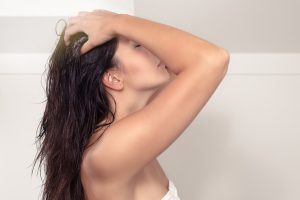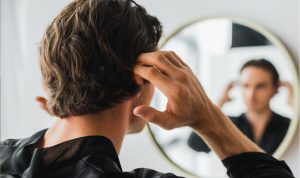When the sensitive scalp itches, it can sometimes be a real headache. Those affected usually can’t hold back and scratch. Unfortunately, this only helps for a short time. This is because scratching against the itching on the scalp triggers a vicious circle.
To effectively combat dry and itchy scalps, we consulted a dermatologist. Answers and advice on how to improve the condition of the skin and how itching occurs in the first place can be found here:
What characterizes a healthy scalp?
Prof. K. Reich: A healthy scalp is inconspicuous. This means: free of dandruff, redness and itching. In addition, the scalp produces neither too much nor too little sebum and has an intact skin barrier. Moisture is well retained and there is no inflammation.
An optimal prerequisite for strong, healthy hair. The skin barrier can naturally ward off pathogens and thus also protect the hair follicles. Good blood circulation ensures the important supply of nutrients to the hair root. Optimal conditions for scalp and hair.
How does itchy scalp actually occur?
Prof. K. Reich: Scalp itching can have many causes. The decisive factors are those that activate nerve fibers to cause irritation of the scalp. These include, for example
- Dry skin, especially in winter or if you wash your hair frequently.
- Seborrhoeic dermatitis. This is an oily, scaly scalp with varying degrees of inflammation. An immunological reaction against certain yeasts is discussed as the trigger.
- Psoriasis, which involves inflammatory, often very scaly and thicker plaques. These often extend slightly beyond the hairy head. The outer ear can also be affected. Psoriasis foci often also occur on other parts of the body.
- Neurodermatitis can also lead to itchy, inflammatory changes to the scalp.
- Other possible causes of eczematous changes to the scalp are irritative or allergic reactions, e.g. to hair dyes or shampoos.
- Factors such as stress or hormonal influences can also exacerbate the symptoms.
It is important to find the trigger in order to provide relief. A precise analysis of the condition of the scalp can help to identify the causes that trigger the itching.
How can an itchy scalp be soothed?
If the causes are known, appropriate treatment can then take place. The following measures are recommended for mild cases without chronic skin diseases:
- Use mild, fragrance-free shampoos.
- Use of special shampoos with zinc pyrithione, piroctone olamine or ketoconazole for seborrhoeic dermatitis. A shampoo such as skinicer Sedative Shampoo also contains the microalgae active ingredient Spiralin®, which has an antimicrobial effect and supports the regeneration of the scalp. Combined with ingredients such as panthenol, camomile and willow bark extracts, it helps to relieve inflammation and itching. Mild surfactants and betaines gently cleanse and moisturize, soothing and protecting the scalp.
- Moisturizing lotions for dry scalps.
- Cool compresses can soothe acute irritation.
- Do not scratch to avoid inflammation.
- A balanced diet with plenty of vitamins and minerals also promotes a healthy scalp.
When should a doctor be consulted?
If the symptoms persist, or if there are signs of a skin disease, such as
- Severe dandruff, redness or hair loss,
- Itchy, weeping or bleeding spots.
If home remedies or drugstore products do not bring any improvement after 2 – 3 weeks. Or if psoriasis, neurodermatitis or fungal infections are suspected, a specialist should be consulted. The causes can then be clarified and an appropriate therapy developed.
What are the typical signs of atopic dermatitis?
Prof. K. Reich: Neurodermatitis is characterized by severely itchy, reddened and dry areas of skin. Those affected are subject to a never-ending cycle of itching and scratching. A family predisposition is often the cause. However, atopic diseases, such as asthma or hay fever, can also be a cause.
On the scalp, this is usually manifested by diffuse itching, sometimes with small scales and crusts. Redness, a feeling of tightness, weeping or thickened areas of skin can also occur.
Psoriasis on the scalp – how exactly do I recognize it?
Prof. K. Reich: Psoriasis can usually be identified by symptoms such as:
- Thick, silvery-white scales on reddened skin,
- and/or sharply defined plaques. These often occur at the hairline, neck or behind the ears.
The cause is often familial. Psoriasis is often accompanied by psoriasis on other parts of the body such as elbows, knees or nails. Psoriasis can be diagnosed with certainty by a dermatologist, usually without a biopsy.
Home remedies or a special product – what does the dermatologist recommend, or what should you definitely stay away from?
An itchy scalp is a burden that often tempts those affected to try out tips and home remedies. However, not everything is really recommended. Only products and tips that really support the skin and do not put additional strain on it should be used. To name just three recommendations, these include
- Special medical shampoos, e.g. with salicylic acid, zinc, tar preparations, ketoconazole or microalgae extracts.
- Lotions with urea or dexpanthenol.
- Solutions containing cortisone can help with inflammation, as can prescription vitamin D analogs, especially for psoriasis.
Not recommended, however:
- Aggressive household remedies such as vinegar, lemon juice or hot oil, because they irritate the scalp even more.
- Excessive or too hot washing, as well as constant scratching.
- Self-tests with products containing cortisone
Tip:
Further topics relating to scalp health and other expert interviews can be found on ocean-pharma.de in our expert tips.



